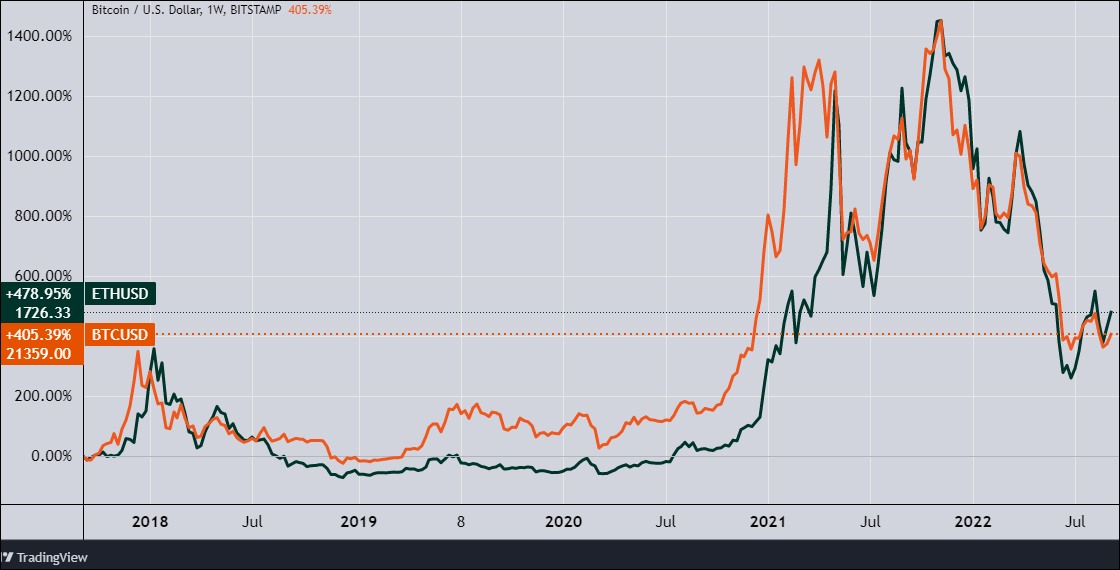Bitcoin and Crypto Taxation in Hungary – the Ultimate Guide

The Bitcoin tax in Hungary is already quite favorable by international standards. Since the 2021 amendment to the law, investors no longer have to pay social contributions, only the 15% income tax. Finally, we can deduct expenses and losses from the tax base. However, there are other significant eases.
There are many forms of taxation of Bitcoin and other cryptocurrencies globally. Some countries have exceptionally favorable laws, sometimes with a zero tax rate. In other countries, investors face heavy tax rates and high administrative burdens.
Some countries treat cryptocurrency assets similarly to other capital market investments. But there are also countries where the legislation does not even recognize this asset class, leaving the taxation of cryptocurrencies completely unclear. Or they outright ban this type of investment.
The 2021 Amendment to the Hungarian Tax Law
The taxation of bitcoin and other cryptocurrencies improved tremendously in 2021 in Hungary, thanks to a new law. The fundamental improvement has moved the taxation of crypto assets from the „unregulated and unfavorable” category to the „regulated and favorable” category. (Law Nr. LXIX of 2021, amending Law on Personal Income Tax Nr. CXVII of 1995).
The 2021 amendment to the Hungarian Personal Income Tax Act has defined the definition of crypto assets and our tax obligations. It significantly reduced the tax burden for individuals and clarified several ambiguous issues.
It is important to identify what is subject to the crypto tax in Hungary. That are any transactions where we exchange cryptocurrency for any other asset. These assets can be fiat money, goods, services, or any entitlements or rights. Any time when we exchange cryptocurrency for another cryptocurrency, we do not have to pay tax.
The Tax Rate on Bitcoin Is Only 15 Percent
As a private investor, the fundamental rule is to pay a personal income tax of 15 percent on crypto assets purchased for investment. (This is a general, so-called single-rate personal-income tax in this country.) For comparison, there are countries in Europe with zero tax, while in other states, the tax can be as high as 30-45 percent. (Source.)
The Market Tells Us the Value
The state levies the new Hungarian bitcoin tax on profits, that is the portion of income that exceeds expenses. That means the prices of purchasing the crypto assets and some other costs of acquiring them (and thus losses) investors can finally deduct from the tax base.
However, according to the tax law in Hungary, the basis of the income is the actual fair market value of the crypto asset. Thus, it may end in futile experimenting with fake transactions that differ from the overall market price.
Finally, They Aren’t Taxing Losses
Under the previous unregulated regime, before 2021, we could also deduct the purchase price of cryptocurrencies from our income. However, only within a single transaction. People could not combine the profits and losses from multiple transactions. Here is a simple example:
- In one transaction, you bought bitcoin for one million forints. (That’s currently about $2,500.) Then you sold it for half a million forints, so at a heavy loss.
- In the other deal, you bought bitcoin for half a million and then sold it for a nice profit, for a million forints. So, in the end, your capital remained unchanged.
- Under the old rules, you then had to pay tax on the half a million forint profit.
- Under the new regulations, your profit is zero, so you pay no tax.
Big Relief for Hodlers
Another significant relief for investors is that we can deduct expenditures incurred in the previous two years from the bitcoin tax base in Hungary. That means the taxpayer can roll over expenses to the following years, however, to a limited extent.
The Hungarian Bitcoin Tax Trick
Since we can only deduct expenses from the previous two years, long-term investors, the hodlers, who think many years ahead, should use a specific strategy. The logical method is to sell all or part of their crypto assets after two to three years before the opportunity to deduct their acquisition expenses has passed.
That will give them tax-free income up to the value of the cost of their purchase. The hodler can then spend this revenue on another cryptocurrency buying, the expenditure on which then provides another three calendar years of tax-free withdrawals. That may be a costly operation, but it is likely cheaper than not being able to deduct the expenses at tax time.

The Bitcoin Tax in Hungary Is Relatively Low. (Picture: Pixabay.com)
Using this trick, we can avoid paying tax on the amount of our original capital invested for a very long time. (In principle, indefinitely. Provided, of course, that the tax rules do not change in the meantime.) In the distant future, we will only have to pay tax on the income above the capital invested, that is, the real profit.
What Is an Expense for the Hungarian Bitcoin Tax?
So you have to pay cryptocurrency tax when you exchange your cryptocurrency for fiat money or some goods, services, or rights. But you can still deduct your expenses. The question is, what expenses can we subtract from the revenue? In this regard, the law says:
Certified expenses incurred in the year of the acquisition of the crypto assets and fees and commissions related to the transactions. (Including certified expenses incurred in the year not connected to a specific transaction but related to the holding of crypto assets.)
This description fits best with fees, commissions, and account management fees on cryptocurrency exchanges. (Although it is conceivable that, for example, hardware wallets such as Ledger or Trezor could also fall into this category.)
Recommended post: Central Bank of Hungary launches its own NFT collection
Tax Relief for Small Bitcoin Sales
There is also a small amount of income that Hungary doesn’t tax at all. The tax-free limit is ten percent of the current monthly gross minimum wage per day. But together, for the full year, not more than the mentioned monthly minimum wage.
That means a maximum of HUF 20,000 per day in 2022. (This is about EUR 50 or USD 50 at the beginning of September 2022.) But these small amounts of income cannot exceed the minimum wage, HUF 200,000 in total. (Once somebody reaches this limit, all small amounts of income become taxable.)

Budapest, Central Market. Photo: Unsplash, Nelson Wong.
This benefit is suitable, for example, to generate small crypto asset revenues in a FinTech application, such as Revolut, which is very popular in Hungary. We can then sell our investment without administrative burdens and without paying tax. That tax-free amount is also very useful if somebody has a cryptocurrency debit card from a cryptocurrency exchange or other service provider and occasionally makes small purchases with it.
This tax-free amount makes it easier for us to get to know and learn about cryptocurrencies. That is suitable for attracting new investors to the sector (onboarding).
Taxation of Miners and Validators
Since the amendment of the Hungarian law in 2021, cryptocurrency miners turned into subject to similar tax rules as traders and investors. Individual miners pay the same tax and can deduct the costs of mining from the proceeds of the sale of their crypto assets in the same way as investors.
The law also mentions the category of „validation and similar activities,” meaning that in addition to proof-of-work mining, operators of proof-of-stake schemes are also subject to these rules. Of course, miners operating in Hungary can also choose to set up a company. That may also have advantages if they can account for their expenses more approvingly in the accounts.
Resources about Starting a Company in Hungary:
Starting a Business in Hungary
Administration of the Bitcoin Tax in Hungary
Even if someone does not have to pay tax on their bitcoin or cryptocurrency because they did not sell it but bought it, it is still unquestionably worth declaring this in their tax report. Because this is a condition for carrying this expenditure forward to subsequent years and reducing your tax later.
Recommended story: Bitcoin Kebab podcast is coming with a special guest
Enormous relief for investors who trade more frequently is that they do not have to pay cryptocurrency tax when they exchange one coin for another. That solves a lot of administration problems. Just think what a burden this would be for frequent day traders. Or if one were to generate regular interest-like, dividend-like cryptocurrency income from staking or DeFi applications.
Crypto Cards and the Beer Tax
Otherwise, it’s not worth just going out for beers with your cryptocurrency-based card, at least above the tax-free limit mentioned above. You could probably wake up with the headache of having to pay tax at the end. You’ll even have to do some administration and declare the crypto-payed beer bill in your tax declaration.

The Famous Szimplakert Ruin Bar, Beer Garden in Budapest, Hungary (Photo: Unsplash, Liam McKay)
In Hungary, you have until 20 May of the following year to declare and pay the tax for the year in question. Often, your workplace or the tax office will do this for you. But if you also have to pay tax on cryptocurrencies, you will probably have to amend your (online) tax form unassisted. Or, if you don’t have a tax statement, have to fill one.
What About the Taxation of NFTs in Hungary?
The definition of crypto assets in the law is quite general.
A digital representation of value or rights that can be transferred and stored electronically using distributed ledger technology or similar technology.
We can apply this definition to all categories of tokens, whether they were issued in series (fungible tokens) or as individual coins (non-fungible tokens, NFTs). Thus, the taxation of NFTs also fits within the general taxation rules.
Similarly, the revenue from DeFis becomes taxable like other cryptocurrency revenues: when you convert it into fiat, goods, or services.
How Can You Become Subject to Hungarian Cryptocurrency Tax?
Of course, those who pay taxes according to Hungarian law are subject to the Hungarian cryptocurrency tax. That applies to people who have a permanent address in Hungary (residents).
In Hungary, similar to most other European countries, are living many people from abroad (ex-pats or expatriates). Most of them live in the capital, Budapest.
Some Resources for Expats in Hungary:
Cryptocurrency Taxation in Hungary Before 2022
As mentioned above, the taxation of crypto assets was unfriendly before the 2021 amendment. The tax office (NAV) considered it as so-called other income, which meant that social security contributions had to be paid in addition to personal income tax. All burdens totaled around 30% of the profits (under the rules at the beginning of 2021). Also, the taxpayer could not always deduct expenses and losses.
Also interesting: First Ever Satoshi Nakamoto Statue to Be Unveiled in Budapest
Amnesty for Evaded Bitcoin Tax in Hungary
In previous years, before the Hungarian state lowered some social contributions, the effective tax rate was even higher, around 33-35 percent. That may be one of the reasons why the 2021 amendment to the cryptocurrency tax law became necessary in Hungary. Many Hungarian investors with massive cryptocurrency investments moved abroad, where the tax was much lower or zero.
However, as part of the 2021 amendment, the more favorable new tax rules could also apply to crypto asset earnings incoming in 2021. And a tax amnesty allows people to legalize cryptocurrency incomes that they didn’t declare in previous years. They can reveal those amounts and pay the Hungarian cryptocurrency tax under the new rules („Amnesty.”) This will be possible by filing the 2022 tax form in spring 2023.
Useful Links And Resouces
Posts in English About The Hungarian Taxation System:
Brief summary of taxation in Hungary (Wikipedia)
Review of Hungarian Tax System
Accounting Services (with Possible Skills on Cryptocurrency Taxes in Hungary):
Cryptocurrency Taxation in Hungary – Accounting Podcast
Recommended Resources in Hungarian:
Text of the 2021 amendment (from paragraph 6).
The Írisz Accountancy Office’s summary of the 2021 Act.
Disclaimer
We wrote this article for information purposes only. It is a brief description and summary of the most significant Hungarian cryptocurrency tax rules, but not advice. If you need specific information or advice, please consult a tax advisor.
On the cover picture: The Hungarian Parliament Made An Advanced Cryptocurrency Law in 2021. (Picture: Pixabay.com)

